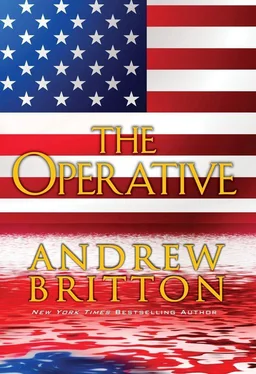Andrew Britton - The Operative
Здесь есть возможность читать онлайн «Andrew Britton - The Operative» весь текст электронной книги совершенно бесплатно (целиком полную версию без сокращений). В некоторых случаях можно слушать аудио, скачать через торрент в формате fb2 и присутствует краткое содержание. Жанр: Триллер, на английском языке. Описание произведения, (предисловие) а так же отзывы посетителей доступны на портале библиотеки ЛибКат.
- Название:The Operative
- Автор:
- Жанр:
- Год:неизвестен
- ISBN:нет данных
- Рейтинг книги:5 / 5. Голосов: 1
-
Избранное:Добавить в избранное
- Отзывы:
-
Ваша оценка:
- 100
- 1
- 2
- 3
- 4
- 5
The Operative: краткое содержание, описание и аннотация
Предлагаем к чтению аннотацию, описание, краткое содержание или предисловие (зависит от того, что написал сам автор книги «The Operative»). Если вы не нашли необходимую информацию о книге — напишите в комментариях, мы постараемся отыскать её.
The Operative — читать онлайн бесплатно полную книгу (весь текст) целиком
Ниже представлен текст книги, разбитый по страницам. Система сохранения места последней прочитанной страницы, позволяет с удобством читать онлайн бесплатно книгу «The Operative», без необходимости каждый раз заново искать на чём Вы остановились. Поставьте закладку, и сможете в любой момент перейти на страницу, на которой закончили чтение.
Интервал:
Закладка:
He was a man who looked like he’d just lost his daughter.
Kealey didn’t go directly over. He stopped at a coffee shop that was just opening, waited to go in, then got himself a tall black hazelnut and a couple of biscotti. He washed the tea taste from his mouth, then walked over to the gate.
“Reed?” he asked.
The man was staring at a color tablet. Kealey caught a glance before Bishop clicked it off. He was reading the Christian Science Monitor. Kealey knew the paper well. More than a few times he’d tucked himself in a corner of one of their reading rooms around the globe. For some reason, the kind of people who ended up searching for CIA agents never thought to look there. Maybe they thought it was a temple, a sanctuary. Or maybe they thought Company men couldn’t read.
A pair of heavily lidded red eyes looked up. They were set in a pale face that seemed even whiter because the owner hadn’t shaved. “Yes, I’m Reed,” the man said numbly. “Mr. Kealey?”
“Ryan.” He set the bag of biscotti on his carry-on, offered his free hand. Bishop took it mechanically. “Can I get you a coffee? You look like you could use one.”
“No thanks,” he said. “I’ve given up… well, smoking.”
Kealey looked at him. “Okay. I’m guessing you can’t have coffee without a smoke?”
Bishop smiled weakly. “Since I was thirteen.”
“That’s a helluva double whammy. Most people would have trouble with just one or the other.”
“I know. But I promised.”
Kealey didn’t pursue the discussion. He saw the ticket in Bishop’s hand and suggested they board.
The Acela-Amtrak’s equivalent of a bullet train-made the Washington-to-Boston round-trip several times a day, hitting Baltimore, Philadelphia, and New York, among other stops, along the way. As he and Bishop walked along the platform, Kealey did not see a lot of heads in the train’s windows or people on the platform. The conductors were standing beside an open door, chatting.
“Looks like we may have a car to ourselves,” Kealey remarked.
Bishop glanced over and nodded. He was carrying a small gray cabin bag that didn’t seem especially full. It had wheels, but he didn’t use them. Kealey felt the guy was trying hard to be present, but he recognized the mechanical movements, the programmed responses. He hoped Bishop would snap out of it enough to be of some use. He would need help in New York, not extra baggage.
The first-class car wasn’t empty, but it was nearly so. They had the forward section to themselves. There were facing chairs and side-by-side chairs; Kealey selected the former, with a small table between them, close to the door. He didn’t want anyone overhearing what they had to say. That was another advantage trains had over airplanes.
Not that they had anything to say, immediately. Bishop stared out the window as the train moved through the station. Kealey finished his coffee, ate a few bites of a biscotto, and tried to imagine what he was thinking. What does one think when his child dies? In a terrorist attack that he survives.
“You want to talk about it?” Kealey asked.
“Not really.” Realizing that had sounded more dismissive than he’d obviously intended, Bishop looked at him and said, “No thanks.”
“I was there,” Kealey said.
That got Bishop’s attention. “At the convention center?”
Kealey nodded. “I was there for Julie Harper’s dinner.”
Bishop leaned forward. “What do you know?” His eyes were open now, alert.
“Only what you do, I’m guessing,” Kealey said. He leaned into the table. “Reports of an inside job. G-man killed last night near a Trask lab. And… I’m sorry, truly sorry for what you’re going through.”
That caught Bishop off guard. He had gone into professional mode, not thinking of his own loss.
“Thank you,” he said.
“If it’s any consolation, even a small one, I took some of those SOBs out personally,” Kealey told him.
“Not at the dinner,” Bishop said. “I was there.”
“No. We were in the parking garage when it all started. Armed myself from my little trunk arsenal, made our way in through a kind of back door.”
“We?”
“My date, sort of. Allison Dearborn, a Company shrink. Her nephew-”
“Was the one who tweeted,” Bishop said. “I heard about that. Your idea?”
“We all pitched in.”
“Well done,” Bishop said. “That’s why you’re on this job. Couple of directors playing who-can-you-trust.”
“Pretty much. What about you?”
“You mean, how did I get picked?” Bishop asked. He shrugged a shoulder. “Who knows why the higher-ups do what they do. I spent most of my career behind a desk. Then, suddenly, I got a field assignment.” Bishop smiled thinly and looked down. “It does matter, Ryan.”
“Sorry?”
“What you did in Baltimore,” Bishop said. “You got a chance to act. I’ve never felt so goddamn helpless.”
“It’s only temporary,” Kealey assured him. “We’re going to find these guys, and we’re gonna skin them.”
Bishop nodded. “You ever smoke?”
“No. I’m vice free.”
“Really?”
“Sure. Unless we’re including the Ten Commandments.”
That drew a little smile from Bishop. “I promised my daughter I’d quit. Just when I need one most.”
Bishop looked like he was about to lose it, and Kealey sat back to give him space. Bishop rallied when the conductor came by for their tickets, followed by a porter, who asked them if they wanted anything to eat or drink. Kealey hoped he didn’t ask for anything hard. He didn’t. All he wanted was water and a bran muffin. Kealey was guessing that would be the first food he’d had in a lot of hours.
There was usually a lot of get-to-know-you chat on an almost three-hour train ride, but not this time. Kealey didn’t think Bishop was snubbing him when he went back to his tablet and checked e-mails. But it also didn’t help Kealey get to know the man on whom his life could possibly depend. That was important. He didn’t want to be relying on a man-even a thoroughgoing professional-whose thoughts were elsewhere.
“I probably know the answer, but why did you agree to this?” Kealey asked.
“You mean, now?”
Kealey nodded.
“I could ask you the same thing,” Bishop said. His reply wasn’t challenging; it was a simple statement.
“I don’t follow,” Kealey said. “I didn’t lose anyone-”
“If you were still officially a Company man, you would have been given mandatory leave. You killed people in Baltimore. Enemy combatants as far as we know, but there’s been no investigation. The good fortune of you being in the right place at the right time, and armed, has not been questioned.”
Kealey made a face. “I don’t think I like that.”
“You misunderstand,” Bishop said. “Or maybe I’m not making myself clear. I don’t doubt you. But standard operating procedure has gone out the window. It always does in these situations.”
“I’m here because the president asked me to be,” Kealey replied. “I have a habit of saying what’s on my mind, which is one reason I’m not a Company man anymore. Brenneman obviously felt the situation required that kind of outside point of view.”
“And someone who was already primed by action, maybe even a little hair trigger after the day’s events,” Bishop said. “The president wanted a pit bull and not a bloodhound. I’ve seen hundreds of psych profiles over the years to understand how people get into one of the ‘triple o’ situations, where they overreact, overreach, or overcompensate. That’s why ninety percent of my subjects go bad. Not because they are bad, but because they shouldn’t have been doing what they were.”
Читать дальшеИнтервал:
Закладка:
Похожие книги на «The Operative»
Представляем Вашему вниманию похожие книги на «The Operative» списком для выбора. Мы отобрали схожую по названию и смыслу литературу в надежде предоставить читателям больше вариантов отыскать новые, интересные, ещё непрочитанные произведения.
Обсуждение, отзывы о книге «The Operative» и просто собственные мнения читателей. Оставьте ваши комментарии, напишите, что Вы думаете о произведении, его смысле или главных героях. Укажите что конкретно понравилось, а что нет, и почему Вы так считаете.












